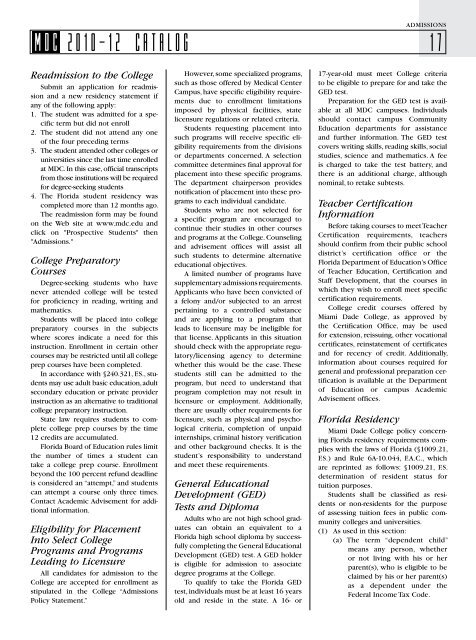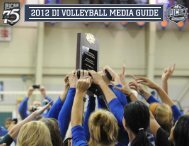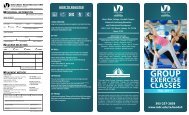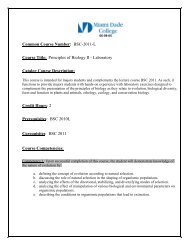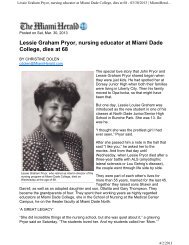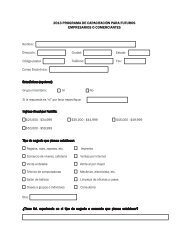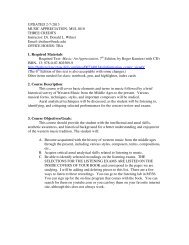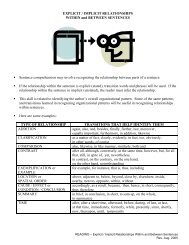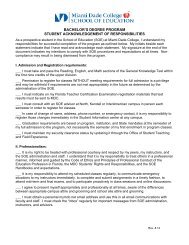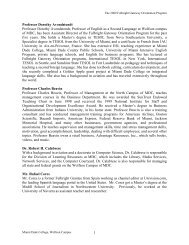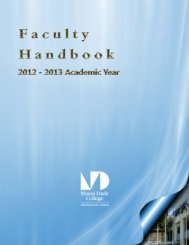Catalog 2010-2012 - Miami Dade College
Catalog 2010-2012 - Miami Dade College
Catalog 2010-2012 - Miami Dade College
You also want an ePaper? Increase the reach of your titles
YUMPU automatically turns print PDFs into web optimized ePapers that Google loves.
M D C 2 0 1 0 - 1 2 C A T A L O G 1 7<br />
Readmission to the <strong>College</strong><br />
Submit an application for readmission<br />
and a new residency statement if<br />
any of the following apply:<br />
1. The student was admitted for a specific<br />
term but did not enroll<br />
2. The student did not attend any one<br />
of the four preceding terms<br />
3. The student attended other colleges or<br />
universities since the last time enrolled<br />
at MDC. In this case, official transcripts<br />
from those institutions will be required<br />
for degree-seeking students<br />
4. The Florida student residency was<br />
completed more than 12 months ago.<br />
The readmission form may be found<br />
on the Web site at www.mdc.edu and<br />
click on "Prospective Students" then<br />
"Admissions."<br />
<strong>College</strong> Preparatory<br />
Courses<br />
Degree-seeking students who have<br />
never attended college will be tested<br />
for proficiency in reading, writing and<br />
mathematics.<br />
Students will be placed into college<br />
preparatory courses in the subjects<br />
where scores indicate a need for this<br />
instruction. Enrollment in certain other<br />
courses may be restricted until all college<br />
prep courses have been completed.<br />
In accordance with §240.321, F.S., students<br />
may use adult basic education, adult<br />
secondary education or private provider<br />
instruction as an alternative to traditional<br />
college preparatory instruction.<br />
State law requires students to complete<br />
college prep courses by the time<br />
12 credits are accumulated.<br />
Florida Board of Education rules limit<br />
the number of times a student can<br />
take a college prep course. Enrollment<br />
beyond the 100 percent refund deadline<br />
is considered an “attempt,” and students<br />
can attempt a course only three times.<br />
Contact Academic Advisement for additional<br />
information.<br />
Eligibility for Placement<br />
Into Select <strong>College</strong><br />
Programs and Programs<br />
Leading to Licensure<br />
All candidates for admission to the<br />
<strong>College</strong> are accepted for enrollment as<br />
stipulated in the <strong>College</strong> “Admissions<br />
Policy Statement.”<br />
However, some specialized programs,<br />
such as those offered by Medical Center<br />
Campus, have specific eligibility requirements<br />
due to enrollment limitations<br />
imposed by physical facilities, state<br />
licensure regulations or related criteria.<br />
Students requesting placement into<br />
such programs will receive specific eligibility<br />
requirements from the divisions<br />
or departments concerned. A selection<br />
committee determines final approval for<br />
placement into these specific programs.<br />
The department chairperson provides<br />
notification of placement into these programs<br />
to each individual candidate.<br />
Students who are not selected for<br />
a specific program are encouraged to<br />
continue their studies in other courses<br />
and programs at the <strong>College</strong>. Counseling<br />
and advisement offices will assist all<br />
such students to determine alternative<br />
educational objectives.<br />
A limited number of programs have<br />
supplementary admissions requirements.<br />
Applicants who have been convicted of<br />
a felony and/or subjected to an arrest<br />
pertaining to a controlled substance<br />
and are applying to a program that<br />
leads to licensure may be ineligible for<br />
that license. Applicants in this situation<br />
should check with the appropriate regulatory/licensing<br />
agency to determine<br />
whether this would be the case. These<br />
students still can be admitted to the<br />
program, but need to understand that<br />
program completion may not result in<br />
licensure or employment. Additionally,<br />
there are usually other requirements for<br />
licensure, such as physical and psychological<br />
criteria, completion of unpaid<br />
internships, criminal history verification<br />
and other background checks. It is the<br />
student’s responsibility to understand<br />
and meet these requirements.<br />
General Educational<br />
Development (GED)<br />
Tests and Diploma<br />
Adults who are not high school graduates<br />
can obtain an equivalent to a<br />
Florida high school diploma by successfully<br />
completing the General Educational<br />
Development (GED) test. A GED holder<br />
is eligible for admission to associate<br />
degree programs at the <strong>College</strong>.<br />
To qualify to take the Florida GED<br />
test, individuals must be at least 16 years<br />
old and reside in the state. A 16- or<br />
ADMISSIONS<br />
17-year-old must meet <strong>College</strong> criteria<br />
to be eligible to prepare for and take the<br />
GED test.<br />
Preparation for the GED test is available<br />
at all MDC campuses. Individuals<br />
should contact campus Community<br />
Education departments for assistance<br />
and further information. The GED test<br />
covers writing skills, reading skills, social<br />
studies, science and mathematics. A fee<br />
is charged to take the test battery, and<br />
there is an additional charge, although<br />
nominal, to retake subtests.<br />
Teacher Certification<br />
Information<br />
Before taking courses to meet Teacher<br />
Certification requirements, teachers<br />
should confirm from their public school<br />
district’s certification office or the<br />
Florida Department of Education’s Office<br />
of Teacher Education, Certification and<br />
Staff Development, that the courses in<br />
which they wish to enroll meet specific<br />
certification requirements.<br />
<strong>College</strong> credit courses offered by<br />
<strong>Miami</strong> <strong>Dade</strong> <strong>College</strong>, as approved by<br />
the Certification Office, may be used<br />
for extension, reissuing, other vocational<br />
certificates, reinstatement of certificates<br />
and for recency of credit. Additionally,<br />
information about courses required for<br />
general and professional preparation certification<br />
is available at the Department<br />
of Education or campus Academic<br />
Advisement offices.<br />
Florida Residency<br />
<strong>Miami</strong> <strong>Dade</strong> <strong>College</strong> policy concerning<br />
Florida residency requirements complies<br />
with the laws of Florida (§1009.21,<br />
F.S.) and Rule 6A-10.044, F.A.C., which<br />
are reprinted as follows: §1009.21, F.S.<br />
determination of resident status for<br />
tuition purposes.<br />
Students shall be classified as residents<br />
or non-residents for the purpose<br />
of assessing tuition fees in public community<br />
colleges and universities.<br />
(1) As used in this section:<br />
(a) The term “dependent child”<br />
means any person, whether<br />
or not living with his or her<br />
parent(s), who is eligible to be<br />
claimed by his or her parent(s)<br />
as a dependent under the<br />
Federal Income Tax Code.


